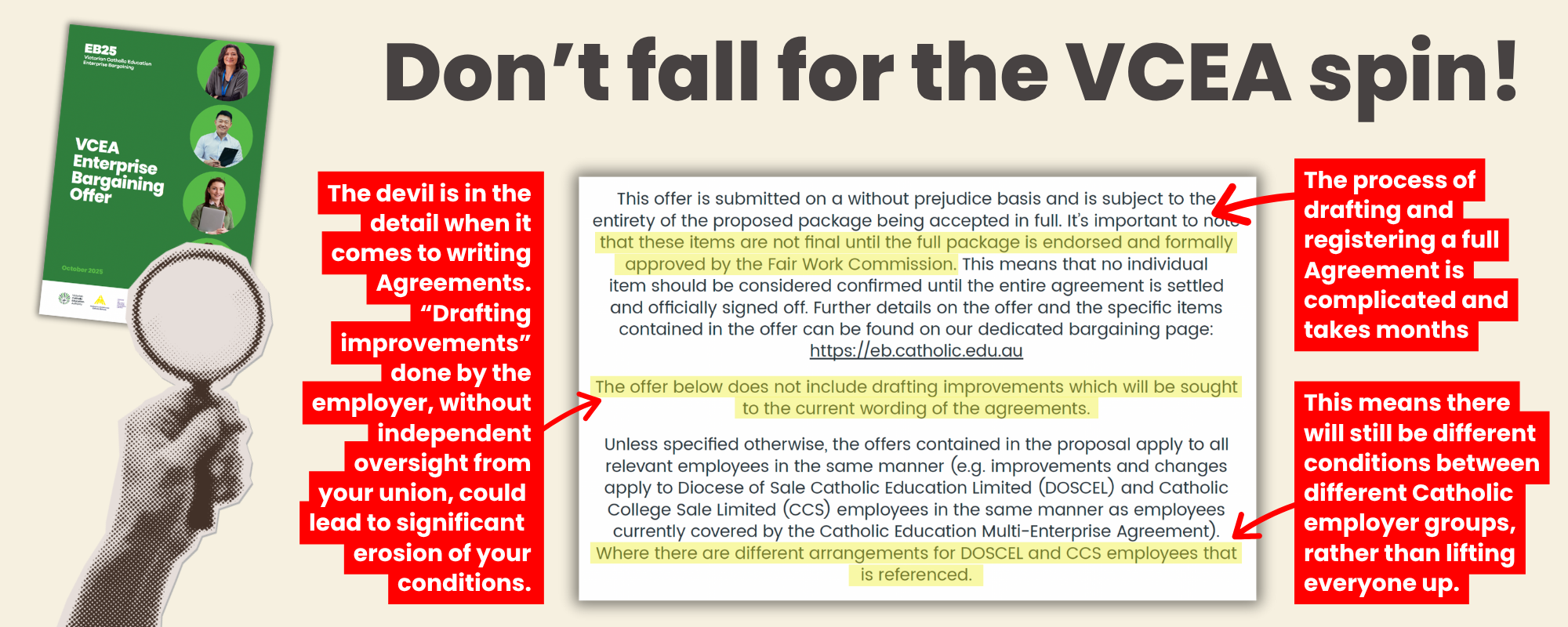Mythbusting VCEA misinformation
In the Victorian Catholic sector, bargaining has traditionally been slow and difficult. This time, even before bargaining has commenced, we are seeing an unprecedented spread of misinformation.
The extent of these mistruths is so significant that we cannot simply allow them to stand. It is necessary to call them out directly, so that the bargaining process can proceed on the basis of facts rather than falsehoods.
Here are just some of the misconceptions we must challenge:
Myth: “If you’ve signed the Statement of Support for the Single Interest Authorisation (SIA), you can still support the VCEA offer.”
Facts:
No: The VCEA’s so-called “offer” is an attempt to circumvent the campaign for fair bargaining.
The VCEA’s staff “survey” is not a legitimate vote or a negotiated outcome. It’s a tactic designed to create the appearance of agreement so that employers can argue to the Fair Work Commission (FWC) that they should be allowed to hold an actual vote on their “offer” ̶ without bargaining at all.
Here’s what’s really happening:
This is not bargaining. Catholic employers have refused to meet with the IEU under an SIA, which would give you real bargaining rights and access to protected industrial action.
The “survey” is not binding. It has no legal standing; it’s simply a way for the VCEA to spin their way into pressuring the union, and failing that the FWC, for a formal vote.
So while it might seem harmless to “support” the offer and also sign the Statement of Support, the two actions work against each other. The only way to secure real improvements to pay and conditions, and protect what we already have, is by standing together for bargaining through the SIA.
What to do
When you receive the VCEA’s survey link indicate that you do not support the offer. Just say No.
Don’t abstain ̶ your response matters.Sign the Statement of Support for the SIA so we can begin negotiations, with full bargaining rights and the collective strength of Catholic education staff across Victoria.
Sign here: ieu.news/sos
MYTH: “Teachers in NSW have a higher face-to-face load than Victorian Catholic teachers, so our conditions are already better.”
Facts:
This claim is misleading and wrong.
The “20 hours” figure the VCEA cites for NSW secondary schools includes non-teaching duties like sport and co-curricular activities. Actual classroom teaching time in NSW secondary schools is around 18.6 hours. The asterisk (*) in their comparison table tells the story: those extra hours are not face-to-face teaching.
On top of that in our last negotiated EBA, the reduction of Scheduled Class Time in Victoria was a major step forward. The VCEA’s “offer” seeks to increase it again in Specialist Schools (upping to 21 hours of SCT per week) shows that they are looking to claw back these hard won entitlements.
Myth: “Catholic schools don’t have the money for more than a 7% pay rise - we’d have to cut student activities.”
Facts:
The IEU has been clear that any claim for increased wages must be fundable. We are not asking for the impossible. Our Log of Claims reflects what members believe is both fair and achievable within a properly resourced agreement.
In past bargaining rounds, employers have raised arguments about the cost of camps, sports, and co-curricular programs. Yet those activities have survived bargaining for fair wages and conditions. While budgets are tight, many of these “expense” claims are being used more as negotiating pressure than as genuine barriers.
It is also important to remember that Catholic schools are heavily supported by public funding. After parent fees, around 80 percent of government funding comes from the Commonwealth, with the balance from state governments. This provides a solid funding base that can be leveraged. Other jurisdictions, such as NSW and the ACT, have managed to deliver higher wages while still maintaining activities for students. There is no reason Victorian Catholic schools cannot do the same.
The IEU offered to dedicate time and resources to campaigning for increased state and federal government funding if the VCEA agreed to bargain under a Single Interest Authorisation. The VCEA refused.
The AEU, whose members already have full bargaining rights, are campaigning for and winning funding increases, pushing the public funding baseline higher. Those gains shape what’s possible across education sectors.
Myth: The IEU is trying to split up Victorian Catholic education and we’ll end up with multiple Agreements.
Facts:
It’s always been the union’s intention that one Agreement cover all of Victorian Catholic education.
In the last negotiations, there was a split because of employer dysfunction under ‘cooperative’ bargaining and DOSCEL signed an Agreement eight months before other employers.
The simplest way to ensure one strong consistent agreement and a unified sector is for the employers to apply for an SIA. The IEU have repeatedly requested they apply since early in the year. They have denied this each time, without reasonable explanation.
It is absolutely our intention to ensure that we get the whole sector bargaining as a single interest. That’s why, after being rebuffed repeatedly, we have to try force the employers to bargain as a unified entity! The union has gone to great lengths to apply for an SIA ourselves, working to achieve majority support at each employer. That’s why we need staff everywhere to sign a statement of support.




